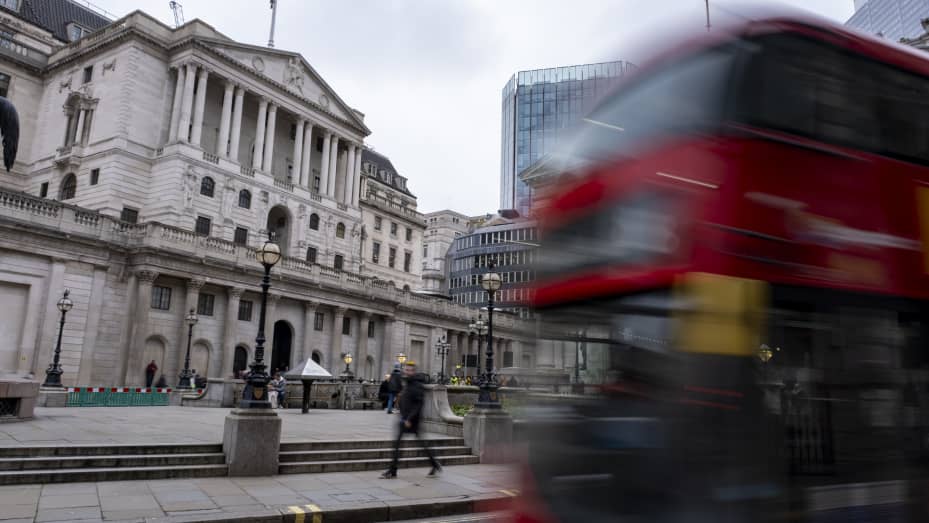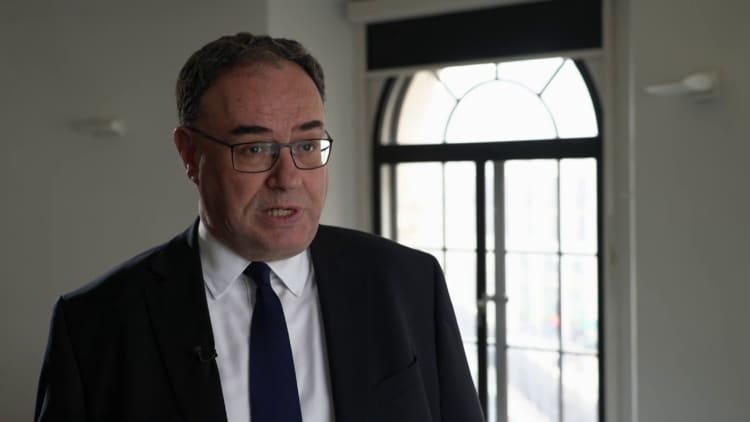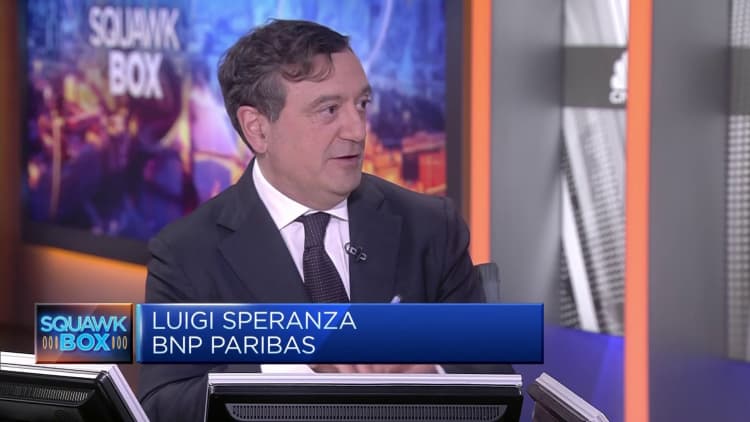
LONDON — The Bank of England on Thursday held interest rates steady at 5.25%, but hinted at cuts on the horizon as inflation falls faster than expected.
The Monetary Policy Committee voted 8-1 to keep rates steady, with one member voting to cut by 25 basis points to 5%. Notably, no members voted for further hikes for the first time in this cycle, after two members favored a quarter-point increase at the previous meeting.
“In recent weeks we’ve seen further encouraging signs that inflation is coming down,” Bank of England Governor Andrew Bailey said in a statement.
“We’ve held rates again today at 5.25% because we need to be sure that inflation will fall back to our 2% target and stay there. We’re not yet at the point where we can cut interest rates, but things are moving in the right direction.”
Headline inflation slid by more than expected to an annual 3.4% in February, hitting its lowest level since September 2021, data showed Wednesday.
The central bank expects the consumer price index to return to its 2% target in the second quarter, as the household energy price cap is once again lowered in April.

“Headline CPI inflation has continued to fall back relatively sharply in part owing to base effects and external effects from energy and goods prices,” the MPC said in its report.
“The restrictive stance of monetary policy is weighing on activity in the real economy, is leading to a looser labour market and is bearing down on inflationary pressures. Nonetheless, key indicators of inflation persistence remain elevated.”
The MPC maintained that monetary policy “will need to remain restrictive for sufficiently long to return inflation to the 2% target sustainably in the medium term.”
It also said it will continue to "monitor indications of persistent inflationary pressures and resilience in the economy as a whole," including labor market conditions, wage growth and services inflation.
The U.K. economy slid into a technical recession in the final quarter of 2023 and has endured two years of stagnation, meaning the central bank is performing a precarious balancing act between steering inflation sustainably back to 2% and avoiding pushing the economy into a prolonged downturn.
Major central banks around the world are trying to determine when to begin unwinding monetary policy after two years of rapid tightening, in a bid to tame a global inflation surge.
The U.S. Federal Reserve on Wednesday held steady on rates and stuck with its forecast for three rate cuts this year, with Chair Jerome Powell seeking confirmation that inflation is returning to the 2% target despite a recent spate of hotter-than-expected readings.
'Dovish shift'
Sterling retreated, and U.K. bonds rallied following the announcement , suggesting that the market is interpreting the decision as a dovish pivot, with the two most hawkish MPC members — Catherine Mann and Jonathan Haskel — dropping calls for a further hike.
"While interest rates staying on hold again was expected, the more dovish vote split and meeting minutes suggest that rate setters are opening the door for rate cuts later this year," said Suren Thiru, economics director at ICAEW.
"Though this interest rate hiking cycle is firmly in the rear-view mirror, the long delay between tightening policy and its impact on the wider economy means that the heavy toll of 14 rate rises has yet to fully crystalise."

Thiru accused the Bank of being "overly cautious" on potential rate cuts, given the rate of the inflation slowdown and an economy in recession. He suggested that keeping policy "too tight for too long" risks prolonging the country's economic struggles.
PwC Chief Economist Barret Kupelian noted that the MPC will likely want to see more concrete evidence that inflationary pressures are cooling on the three fronts of labor market tightness, wage growth and services inflation, before acting.
"There is significant evidence from surveys, economic data as well as my own conversations with business that the labour market is cooling, but what is unique in the current economic cycle is the uncharacteristically high levels of relative economic inactivity and skills mismatches," Kupelian said.
"Both of these factors distort the adjustment required on the supply side of the labour market, making the normalisation of wage growth rates more choppy and uncertain. As a result, the Bank is in wait-and-see mode."
‘On the verge of declaring victory’
Hussain Mehdi, director of investment strategy at HSBC Asset Management, said central banks across major economies “look to be on the verge of declaring victory” in the battle against inflation.
The Swiss National Bank on Thursday became the first central bank in an advanced economy to cut rates, and Mehdi highlighted that the Bank of England’s tone has become “significantly less hawkish,” as reflected by the two MPC holdouts falling into line with the majority vote.
″‘Stickier’ elements of core inflation – predominantly services – now account for the bulk of inflationary pressure but continue to improve. A cooling labour market helps on this front. On the balance of the data, our central scenario of transatlantic rate cuts introduced by the summer remains intact,” Mehdi said in an email on Thursday.
“However, there are likely to be some speedbumps on the last mile of disinflation; data can be volatile, and several risks remain in play. The U.K. labour market is cooling, but is still tight amid a trend of people dropping out of the labour market, and core CPI is higher in the U.K. versus the U.S. and eurozone which could mean the BoE lags a bit in the easing cycle.”
HSBC says inflation will stay higher than it was during the 2010s, as the global economy becomes more fragmented and fiscal policy remains active — which could mean a “slow cutting cycle” ending with rates hovering around 3%.
